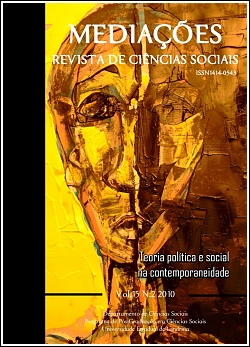Representation and imperialism in Edward Said
DOI:
https://doi.org/10.5433/2176-6665.2010v15n2p42Keywords:
Representation, Imperialism, Post-colonialism, Culture and PoliticsAbstract
Based on the idea that culture and identities involve a politically built process, the importance of the concepts of representation and imperialism in the work of Edward Said is discussed. The article analyses two of the author's general proposals. Firstly, the thesis of the centrality of cultural dimension in political relations, which leads to the review of postulates that consider culture as a mere reflection of a phenomena seen as essential or as a sphere isolated from the power practices. Secondly, the study examines how the author's conception of imperialism is used as a means of identification that keep structures of authority and hegemony, which, in turn, may be defied by processes of resistance. Finally, the validity of the open character of Said's political theory is debated, which encompasses both the power of representations and an action of political questioning.Downloads
References
BHABHA, Homi. The location of culture. Routledge: London, 1994.
BHAMBRA, Gurminder K. Sociology and postcolonialism: another 'missing' revolution? Sociology, n. 41, p. 871-884, 2007.
BREUILLY, John. Abordagens do nacionalismo. In: BALAKRISHNAN, Gopal (org.). Um mapa da questão nacional. Rio de Janeiro: Contraponto, 2000. p. 155-184.
CHATTERJEE, Partha. The nation and its fragments: colonial and postcolonial histories. Princeton: Princeton University Press, 1993.
EDER, Klaus. Identidades coletivas e mobilização de identidades. Revista Brasileira de Ciências Sociais, v. 18, n. 53, p. 5-18, out. 2003.
FANON, Frantz. Os condenados da terra. Rio de Janeiro: Civilização Brasileira, 1979.
FOUCAULT, Michel. História da sexualidade I: a vontade de saber. Rio de Janeiro: Graal, 1988.
FOUCAULT, Michel. A ordem do discurso. São Paulo: Loyola, 2001.
FOUCAULT, Michel. Em defesa da sociedade. Curso no Collège de France (1975-1976). São Paulo: Martins Fontes, 2005.
GRAMSCI, Antonio. Maquiavel, a política e o estado moderno. Rio de Janeiro: Civilização Brasileira, 1976.
HOBSBAWM, Eric. Etnia e nacionalismo na europa de hoje. In: BALAKRISHNAN, Gopal (org.). Um mapa da questão nacional. Rio de Janeiro: Contraponto, 2000. p. 271-282.
LOOMBA, Ania. Colonialism/postcolonialism. Routledge: London: New York, 2005.
RINESI, Eduardo. Nación y estado en la teoría y en la política. In: VERNIK, Esteban (comp.). Qué es una nación: la pregunta de renan revisitada. Buenos Aires: Prometeo Libros, 2004. p. 169-179.
SAID, Edward. Cultura e imperialismo. São Paulo: Companhia das Letras, 1995.
SAID, Edward. An interview with Edward W. Said. In: BAYOUMI, M.; RUBIN, A. (ed.). The Edward Said Reader. New York: Vintage Books, 2000.
SAID, Edward. Power, politics, and culture: interviews with Edward W. Said. New York: Vintage Books, 2002.
SAID, Edward. Representações do intelectual: as conferências Reith de 1993. São Paulo: Cia das Letras, 2005.
SAID, Edward. Humanismo e crítica democrática. São Paulo: Cia das Letras, 2007a.
SAID, Edward. Orientalismo: o oriente como invenção do ocidente. São Paulo: Cia das Letras, 2007b.
SPIVAK, Gayatri C. Can the Subaltern Speak? In: WILLIAMS, Patrick; CHRISMAN, Laura (ed.). Colonial discourse and post-colonial theory: a reader. New York: Columbia University Press, 1994. p. 66 - 111.
WEDEEN, Lisa. Conceptualizing culture: possibilities for political science. American Political Science Review, v. 96, n. 4, p. 713-728, dec. 2002.
WILLIAMS, Raymond. Marxismo e literatura. Rio de Janeiro: Zahar, 1979.
Downloads
Published
How to Cite
Issue
Section
License
Copyright (c) 2010 Bruno Sciberras de Carvalho

This work is licensed under a Creative Commons Attribution 4.0 International License.
Copyright on articles published in Mediações belongs to the author(s): in the case of partial or entire republication of the original publication, we ask author(s) to indicate the original publication in the periodical.
Mediações uses the Creative Commons Attribution 4.0 International license, which allows Open Access, enabling any user to read, download, copy and disseminate its content so long as adequately referenced.
The opinions expressed by the author(s) are their sole responsibility.
































